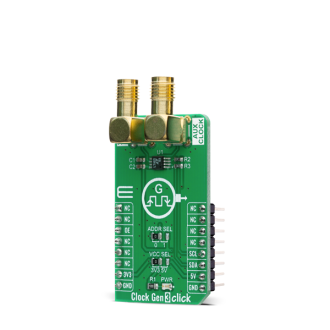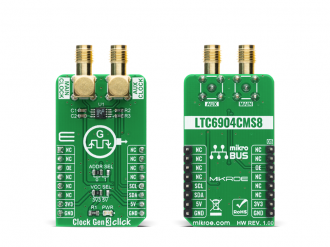
We strongly encourage users to use Package manager for sharing their code on Libstock website, because it boosts your efficiency and leaves the end user with no room for error. [more info]

Rating:
Author: MIKROE
Last Updated: 2021-03-10
Package Version: 1.0.0.0
mikroSDK Library: 1.0.0.0
Category: Clock generator
Downloaded: 3297 times
Not followed.
License: MIT license
Clock Gen 3 Click features a low power self-contained digital frequency source providing a precision frequency from 1kHz to 68MHz, set through a serial port.
Do you want to subscribe in order to receive notifications regarding "Clock Gen 3 click" changes.
Do you want to unsubscribe in order to stop receiving notifications regarding "Clock Gen 3 click" changes.
Do you want to report abuse regarding "Clock Gen 3 click".


Library Description
The library contains basic functions for working with Clock Generator 3 click.
Key functions:
void clockgen3_set_freq( float freq ) - Sets Frequencyvoid clockgen3_config( uint8_t cfg ) - ConfigurationExamples description
The application is composed of three sections :
void application_task ( )
{
mikrobus_logWrite( ">> Set Freq = 12.000 MHz", _LOG_LINE );
clockgen3_set_freq( 12000.0 );
Delay_ms( 3000 );
mikrobus_logWrite( ">> Set Freq = 8.000 MHz", _LOG_LINE );
clockgen3_set_freq( 8000.0 );
Delay_ms( 3000 );
mikrobus_logWrite( ">> Set Freq = 5.500 MHz", _LOG_LINE );
clockgen3_set_freq( 5500.0 );
Delay_ms( 3000 );
mikrobus_logWrite( ">> Set Freq = 2.700 MHz", _LOG_LINE );
clockgen3_set_freq( 2700.0 );
Delay_ms( 3000 );
mikrobus_logWrite( ">> Set Freq = 800 KHz", _LOG_LINE );
clockgen3_set_freq( 800.0 );
Delay_ms( 3000 );
mikrobus_logWrite( ">> Set Freq = 200 KHz", _LOG_LINE );
clockgen3_set_freq( 200.0 );
Delay_ms( 3000 );
mikrobus_logWrite( "----------------------------", _LOG_LINE );
}
Other mikroE Libraries used in the example:
Additional notes and informations
Depending on the development board you are using, you may need USB UART click, USB UART 2 click or RS232 click to connect to your PC, for development systems with no UART to USB interface available on the board. The terminal available in all MikroElektronika compilers, or any other terminal application of your choice, can be used to read the message.